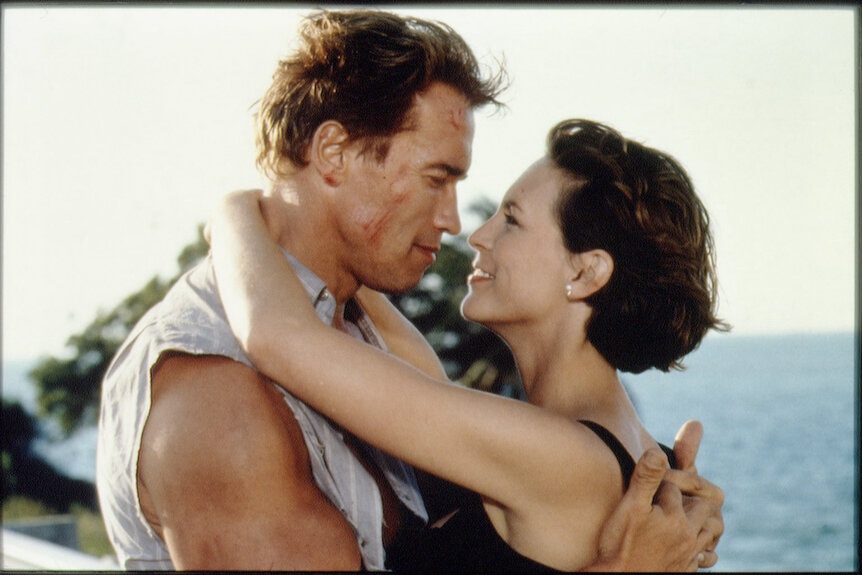Create a free profile to get unlimited access to exclusive videos, sweepstakes, and more!
10 Movie Adaptations with a Wildly Different Tone from Their Source Material
For every hyper-faithful film adaptation, there's another one that takes a lot of liberties.
It's called an "adaptation" for a reason. When you bring a book, or a TV show, or a video game, or a comic book to the big-screen from its original source material, you have to make certain choices. Some choices are in service to length, others in service to character, and still others are in service to making the film version as successful as possible. What works in one medium, after all, doesn't always work in another.
RELATED: Ahead of Twisted Metal, the Best Video Game to TV Series Adaptations
In many cases, these adaptations make it through with just a few changes, and the overall spirit of the source material remains intact. In others, you get something that's vastly different, and even unrecognizable, particularly where tone is concerned. But that doesn't always mean the movie is bad. From horror films to sci-fi epics to unexpected comedies, here are 10 movies that took on big tonal shifts from their source material.
Movie Adaptations That Tonally Departed from Their Source Material
21 Jump Street (2012)
The original 1987 version of 21 Jump Street was a straightforward procedural about a group of cops who looked young enough to run undercover operations around teenagers, and wasn't afraid to go to some pretty dark places in the process. Decades after the show ended, directors Phil Lord and Christopher Miller got hold of the premise, realized it'd be the perfect vehicle for a buddy cop movie, and went to work. The result is a hilarious comedy that retains the initial setup of the show, but not much else.
Cocaine Bear (2023)
Elizabeth Banks' film is ostensibly based on a true story, and indeed it does bear some similarities to something that actually happened. Drug smugglers really did drop a bunch of cocaine in a Southern forest in the 1980s, and a bear really did get hold of some and, briefly, got high on the supply. But apart from the events that set the narrative up, there's not much in common with the rather grim true story of a bear that just didn't know any better and ended up dead after munching on the white powder. The comedy-horror film we got is entertaining, but that's because it's very willing to go its own way.
Stream Cocaine Bear: The True Story on Peacock!
Dracula: Dead and Loving It (1995)
Leave it to Mel Brooks to make an all-out zany comedy based on Bram Stoker's terrifying Dracula. While most of Brooks' films are spoofs that are similar-to-but-distinct from the films they're parodying, Dead and Loving It actually hews fairly closely to the basic plot of Dracula, keeping many of the same characters and events along the way. The difference, of course, is that it's a Mel Brooks movie, and that means this Dracula is anything but terrifying.
RELATED: Cocaine Bear's Elizabeth Banks on Possibility of Directing a Sequel
I, Robot (2004)
While it shares a name with Isaac Asimov's short story collection, and like Asimov's work deals with the implications of heavy human-robot interaction in the future, I, Robot can actually barely be called an adaptation of an Asimov tale. The characters and scenarios are different, Asimov's own theories about robot behavior are often absent from the narrative, and in reality much of the story was gleaned from an original script by co-writer Jeff Vintar. It's a good title, but it has very little to do with the book from which that title was derived.
The Lawnmower Man (1992)
Based on the Stephen King short story of the same name... but not really. The Lawnmower Man arrived at a time when having King's name on the project was a serious box office boon, but despite both stories following the title character as they reveal themselves to be dangerous to those around them, the film and the story are not at all similar. They're so different, in fact, that King sued to get his name taken off the movie, and won. That doesn't happen very often.
Stream Lawnmower Man 2: Beyond Cyberspace on Peacock!
The Mask (1994)
In 1994, Jim Carrey was as hot as a movie star could possibly get, a comedy juggernaut delivering mass appeal in ways that made him an icon. With that in mind, it's understandable that The Mask sought to tone down some of the more extreme elements of the Dark Horse Comics that inspired the film. In the comics, the title mask is much more likely to render just about anyone insane and hyperviolent, no matter how good they might have been in the first place. That makes the wearer into something more like a villain than the cartoonish hero Carrey turned out to be in the film. It's an understandable change, but a very notable one, particularly for someone going back to the comics after only having seen the film.
O Brother, Where Art Thou? (2000)
There is perhaps no more famous epic saga than The Odyssey. We know it even if we haven't read it all, which means we're all aware that the Coen Brothers made some changes for O Brother, Where Art Thou? It's still the story of a man trying to get back home to his family, and he still encounters all manner of strange adventures along the way, but the Coens' version is steeped in Southern folklore, Christianity, and of course, comedy. It's a bold adaptation, but a welcome one.
Starship Troopers (1997)
Paul Verhoeven's adaptation of Robert Heinlein's sci-fi novel of the same name is a tricky one, to the point that it took years for critics and viewers to fully grasp the depths of the satire at work in the film version. Both stories deal with young soldiers fighting in a vast interstellar war on behalf of a worldwide government, but while Heinlein's exploration of this idea was played straight, Verhoeven saw the potential to say something satirical and powerful about fascism and militarism in his version. The results are, as with the novel, somewhat controversial, but always interesting.
RELATED: Could the bugs in 'Starship Troopers' really exist? The science behind the fiction
True Lies (1994)
There are a lot of plot similarities between James Cameron's True Lies and its source material, the 1991 French comedy La Totale!. Both follow a seemingly ordinary man who has a secret life as a spy, and chronicle what happens when his wife gets roped into his real job. The difference begins when you realize that the star of the French version, Thierry Lhermitte, looks like a regular guy, which means his transition into spy is a little less predictable. That's not the case with Arnold Schwarzenegger, who looks every bit an action hero from the moment you see him. That change, plus the amped up action sequences for which the film has become known, make True Lies a much more heightened film, and in the end a sort of wild metaphor for how two people in a marriage can get so bogged down sometimes that they miss the most obvious things about each other's lives.
Winnie the Pooh: Blood and Honey (2023)
We don't really need to spell this one out for you, right? It's Winnie the Pooh as a horror villain. That's just weird.































